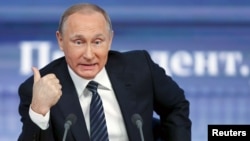Russia's leaders often voice the need to diversify the Russian economy away from a reliance on the export of raw materials, such as oil and gas, in order to stabilize growth.
Revenues from petroleum exports make up almost half the country's federal budget.
At his annual press briefing Thursday, President Vladimir Putin responded to concerns about Russia’s economy, which is projected to contract by about about 4 percent this year, with world oil prices now below $40 a barrel and a devalued currency.
Putin repeated the optimistic outlook that the economy would soon begin to grow.
“Proceeding from the current value of our exports,” he said, “the government is expecting our economy to achieve at least a 0.7 percent growth in 2016, 1.9 percent in 2017 and 2.4 percent in 2018.”
But Putin went on to clarify that those projections were based on oil prices of $50 a barrel. With the price of oil now lower and volatility high, he said, further adjustments would have to be made.
Vladimir Milov, a former Russian deputy minister of energy who now heads the Democratic Choice political party, said he expected oil prices would continue to drop, with further negative consequences for the country.
“The average price of oil for the next year, the whole next year, might be in the range of $35 to $40, which is substantially lower than forecasts that have been recently included in the adopted budget for 2016,” he said. “So, they will have to consider severely cutting federal spending, which is something that has not been done over the whole 16 years of Putin in power.”
No quick adjustment
Still, Putin said the government would not ”rush to adjust the budget, as this would lead to a reduction in the funding of both the social and real sectors.” However, he added, “the government is of course working on different development scenarios.”
Putin repeated well-worn mantras on the economy about increasing production and self-sufficiency while reducing red tape. "Of course, potential GDP growth is not limited to our export-related opportunities," he said. "We must also promote import replacement, which is not a cure-all, but we believe that it will help us retool a large part of the production sector and the agriculture industry.”
The Russian president went on to say: “We must certainly continue working to improve economic management, to de-bureaucratize our economy, and to create more attractive conditions for doing business and for helping entrepreneurs achieve the goals that are facing them and the national economy as a whole.”
According to Milov, Russian politicians have talked about diversifying the economy away from oil and gas since the Soviet era, but the established elites, especially under Putin, benefit too much from the trade to pay attention to anything else.
“Diversification also requires working institutions like rule of law, civil rights, independent judiciary, and many other things which these mineral resource mafias are obviously not interested in,” he said. “So I think this whole idea of diversification — it sounds good in public speeches, but it’s totally contradictory with the fundamentals of this system, which was built by Vladimir Putin.
“So, obviously, economic reform very quickly leads to an environment where Putin would be on the brink of losing political power,” said Milov. “This is one more [reason] to actually expect that he will try to stick to the current system to the bitter end and not let it go.”
Russia’s largest oil and gas companies are run by Putin’s close friends from his years in St. Petersburg: Igor Sechi heads the state oil company Rosneft, while Alexey Miller runs Gazprom, Russia's state-controlled natural gas giant. As oil prices have tumbled, and Rosneft struggles, Russia is considering selling a 19 percent stake in the company. Putin said Thursday that a partial privatization was possible as the state would still retain majority control.
Utilities, gas cost more
Despite the lower world oil prices, energy costs in utilities and at the gas pump have gone up for many Russians, as consumers are hit with an unfavorable ruble exchange rate, over 12 percent inflation and lower disposable incomes.
In the largest industrial action to hit Russia in years, hundreds of truckers across Russia led a weeks-long protest against higher road tolls, blocking highways and even roads leading into Moscow. Despite the notoriously poor quality of Russia's roads, the doubling of transport taxes for 12-ton trucks was criticized not only for poor economic timing, but also because the fees are being enforced by a company controlled by Igor Rotenberg, whose father, oligarch Arkady Rotenberg, is Putin’s former judo partner.
On Thursday, Putin defended the rate hikes, saying the 12-ton trucks caused more road damage than others.
Further social protest is likely as certain groups are hit by the ailing economy and spending cuts, Milov said.
“We might face very strong difficulties, economically, politically, and some turbulence," he said. "But, inevitably, I think Russian society will realize that Putin has led us into a trap, and we have to fundamentally change the current system to achieve a better future. I think more and more people are realizing that now. It will be even more so as economic difficulties are progressing.”





